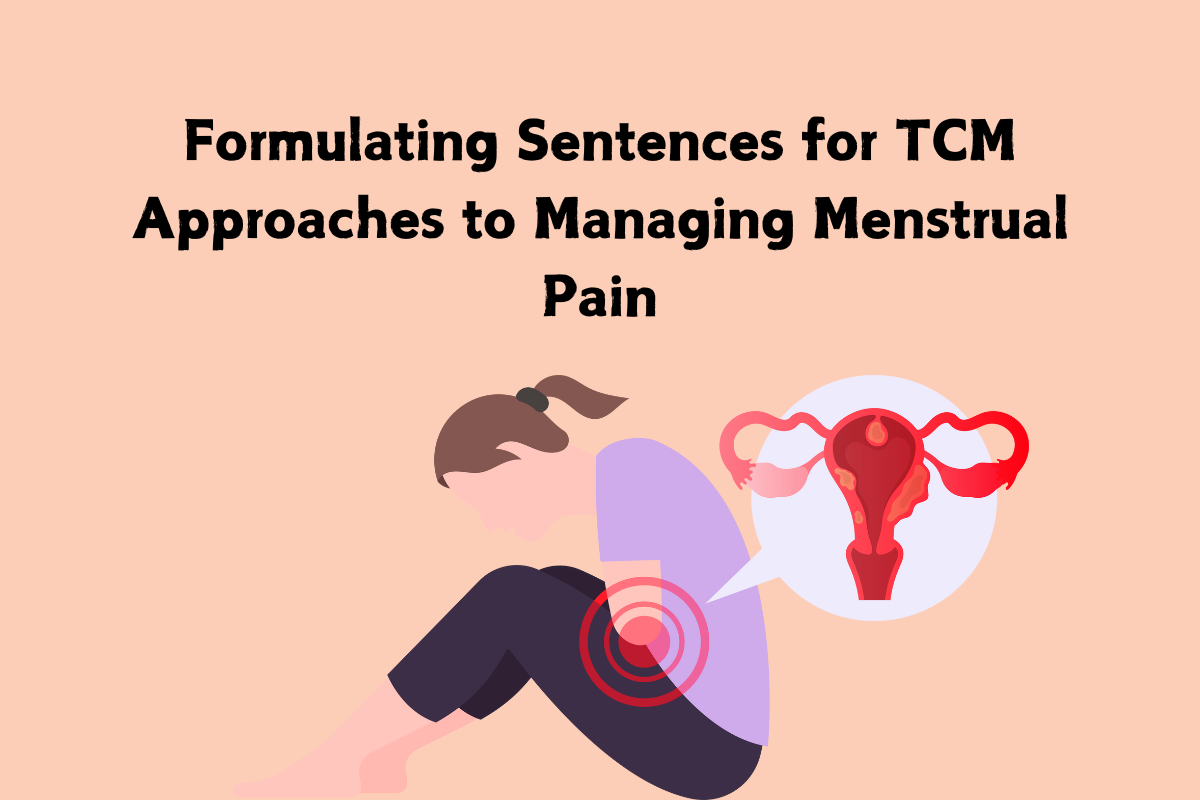Formulating Sentences for TCM Approaches to Managing Menstrual Pain
Menstrual pain is a common issue that many women experience, and Traditional Chinese Medicine (TCM) provides various treatments to alleviate discomfort. TCM approaches to managing menstrual pain often involve acupuncture, herbal remedies, and dietary adjustments. Here are some example dialogues between a patient and a TCM practitioner, demonstrating how TCM can be used to address menstrual pain.

Scene 1: Describing Menstrual Pain
Patient:
I have severe cramps during my menstrual period.
我经期时有严重的腹痛。
Wǒ jīngqī shí yǒu yánzhòng de fùtòng.
Doctor:
How long have you been experiencing this pain?
你有多久了这种疼痛?
Nǐ yǒu duōjiǔ le zhè zhǒng téngtòng?
Patient:
The pain usually starts a day before my period and lasts for the first two days.
疼痛通常在月经来前一天开始,持续两天。
Téngtòng tōngcháng zài yuèjīng lái qián yītiān kāishǐ, chíxù liǎng tiān.
Doctor:
Is the pain sharp, dull, or cramp-like?
疼痛是尖锐的、钝的还是像抽筋一样的?
Téngtòng shì jiānruì de, dùn de hái shì xiàng chōujīn yīyàng de?
Patient:
It feels like cramping and it can be quite intense.
感觉像是抽筋,疼痛相当剧烈。
Gǎnjué xiàng shì chōujīn, téngtòng xiāngdāng jùliè.
Scene 2: Discussing TCM Diagnosis
Patient:
How does TCM diagnose menstrual pain?
中医如何诊断月经疼痛?
Zhōngyī rúhé zhěnduàn yuèjīng téngtòng?
Doctor:
In TCM, menstrual pain is often related to imbalances in the liver and kidney.
在中医中,月经疼痛通常与肝脏和肾脏失衡有关。
Zài zhōngyī zhōng, yuèjīng téngtòng tōngcháng yǔ gānzàng hé shènzàng shīhéng yǒuguān.
Patient:
What kind of treatments are used for these imbalances?
哪些治疗可以用来调节这些失衡?
Nǎxiē zhìliáo kěyǐ yòng lái tiáojié zhèxiē shīhéng?
Doctor:
We use acupuncture and herbal formulas to help balance your liver and kidney.
我们使用针灸和草药方来帮助平衡你的肝脏和肾脏。
Wǒmen shǐyòng zhēnjiǔ hé cǎoyào fāng lái bāngzhù pínghéng nǐ de gānzàng hé shènzàng.
Patient:
How effective is acupuncture for menstrual pain?
针灸对月经疼痛的效果如何?
Zhēnjiǔ duì yuèjīng téngtòng de xiàoguǒ rúhé?
Doctor:
Acupuncture can be very effective in reducing menstrual pain and regulating your cycle.
针灸在减轻月经疼痛和调节周期方面非常有效。
Zhēnjiǔ zài jiǎnqīng yuèjīng téngtòng hé tiáojié zhōuqī fāngmiàn fēicháng yǒuxiào.
Scene 3: Herbal Remedies and Lifestyle Advice
Patient:
Are there any dietary changes I should make?
我应该做哪些饮食上的改变?
Wǒ yīnggāi zuò nǎxiē yǐnshí shàng de gǎibiàn?
Doctor:
Yes, eating warming foods and avoiding cold and raw foods can help reduce pain.
是的,吃温热的食物,避免寒凉和生冷的食物可以帮助减轻疼痛。
Shì de, chī wēnrè de shíwù, bìmiǎn hánliáng hé shēnglěng de shíwù kěyǐ bāngzhù jiǎnqīng téngtòng.